International HRM: Cross-Cultural Competencies for HR Directors
VerifiedAdded on 2022/10/06
|5
|1487
|20
Report
AI Summary
This report delves into the critical competencies required for international HR directors to effectively operate across diverse cultures in the current and future business landscape. It begins by exploring the complexity of cross-cultural differences, highlighting the importance of understanding both low and high-context cultures, and the challenges associated with building trust in international business operations. The report then examines the crucial role of cultural sensitivity and the impact of collectivism versus individualism on team dynamics. Furthermore, it addresses the influence of power structures across different cultures and the importance of adapting HR practices accordingly. The report also outlines the criteria for selecting international managers, emphasizing the need for cultural adaptability, emotional strength, and technological knowledge. Finally, it compares and contrasts international human resource practices, underscoring the need for cross-cultural awareness while acknowledging the differences in managing people across various countries.
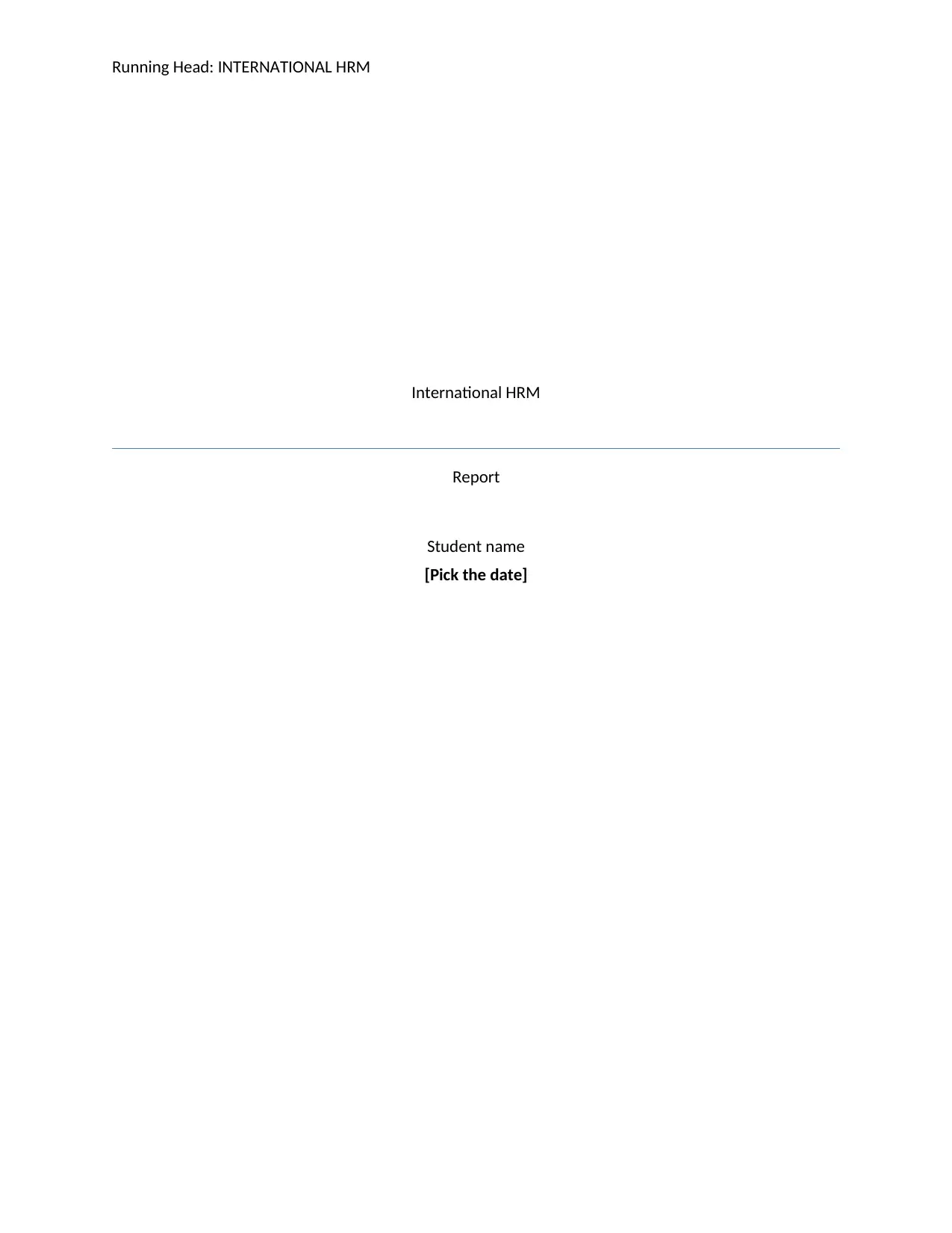
Running Head: INTERNATIONAL HRM
International HRM
Report
Student name
[Pick the date]
International HRM
Report
Student name
[Pick the date]
Paraphrase This Document
Need a fresh take? Get an instant paraphrase of this document with our AI Paraphraser
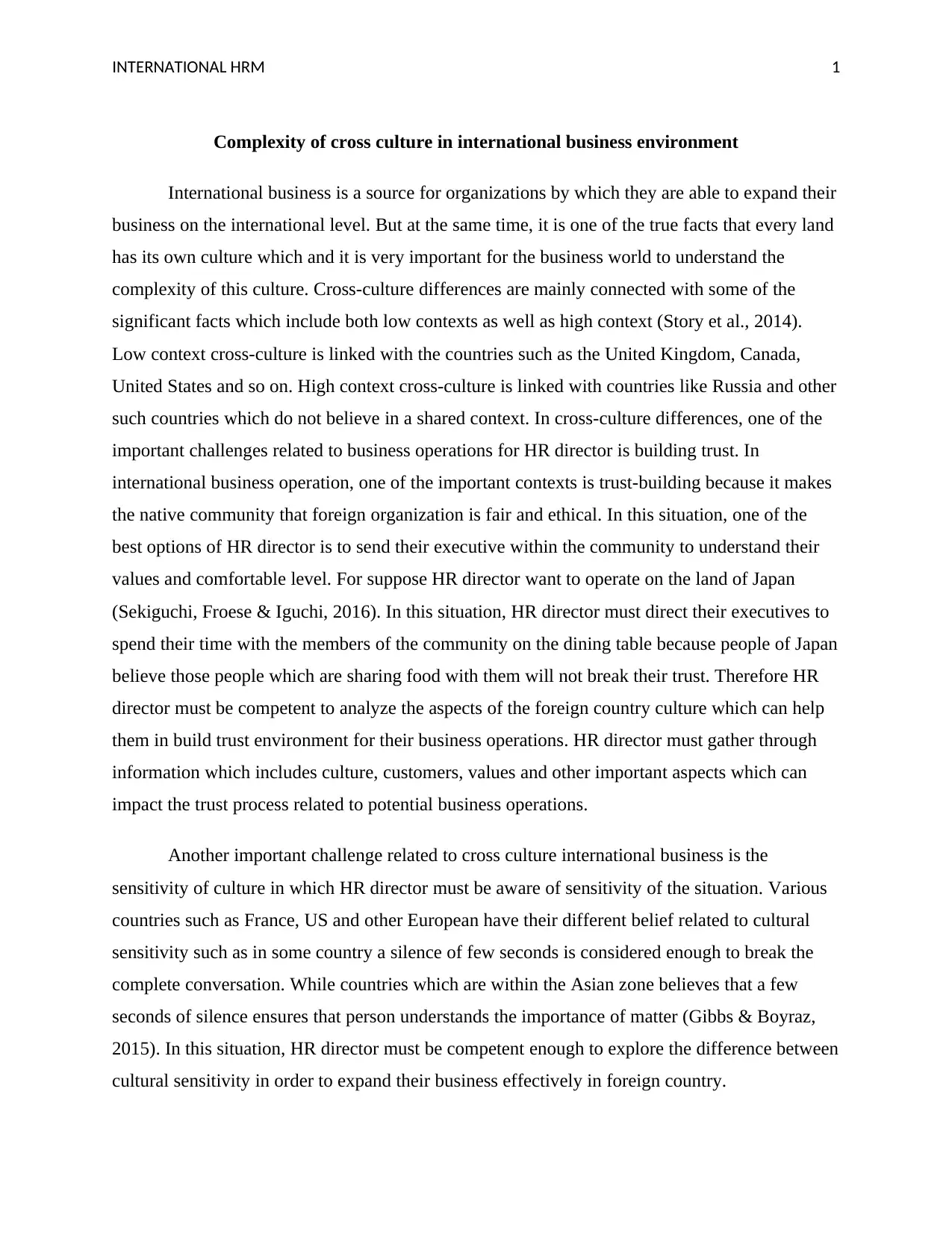
INTERNATIONAL HRM 1
Complexity of cross culture in international business environment
International business is a source for organizations by which they are able to expand their
business on the international level. But at the same time, it is one of the true facts that every land
has its own culture which and it is very important for the business world to understand the
complexity of this culture. Cross-culture differences are mainly connected with some of the
significant facts which include both low contexts as well as high context (Story et al., 2014).
Low context cross-culture is linked with the countries such as the United Kingdom, Canada,
United States and so on. High context cross-culture is linked with countries like Russia and other
such countries which do not believe in a shared context. In cross-culture differences, one of the
important challenges related to business operations for HR director is building trust. In
international business operation, one of the important contexts is trust-building because it makes
the native community that foreign organization is fair and ethical. In this situation, one of the
best options of HR director is to send their executive within the community to understand their
values and comfortable level. For suppose HR director want to operate on the land of Japan
(Sekiguchi, Froese & Iguchi, 2016). In this situation, HR director must direct their executives to
spend their time with the members of the community on the dining table because people of Japan
believe those people which are sharing food with them will not break their trust. Therefore HR
director must be competent to analyze the aspects of the foreign country culture which can help
them in build trust environment for their business operations. HR director must gather through
information which includes culture, customers, values and other important aspects which can
impact the trust process related to potential business operations.
Another important challenge related to cross culture international business is the
sensitivity of culture in which HR director must be aware of sensitivity of the situation. Various
countries such as France, US and other European have their different belief related to cultural
sensitivity such as in some country a silence of few seconds is considered enough to break the
complete conversation. While countries which are within the Asian zone believes that a few
seconds of silence ensures that person understands the importance of matter (Gibbs & Boyraz,
2015). In this situation, HR director must be competent enough to explore the difference between
cultural sensitivity in order to expand their business effectively in foreign country.
Complexity of cross culture in international business environment
International business is a source for organizations by which they are able to expand their
business on the international level. But at the same time, it is one of the true facts that every land
has its own culture which and it is very important for the business world to understand the
complexity of this culture. Cross-culture differences are mainly connected with some of the
significant facts which include both low contexts as well as high context (Story et al., 2014).
Low context cross-culture is linked with the countries such as the United Kingdom, Canada,
United States and so on. High context cross-culture is linked with countries like Russia and other
such countries which do not believe in a shared context. In cross-culture differences, one of the
important challenges related to business operations for HR director is building trust. In
international business operation, one of the important contexts is trust-building because it makes
the native community that foreign organization is fair and ethical. In this situation, one of the
best options of HR director is to send their executive within the community to understand their
values and comfortable level. For suppose HR director want to operate on the land of Japan
(Sekiguchi, Froese & Iguchi, 2016). In this situation, HR director must direct their executives to
spend their time with the members of the community on the dining table because people of Japan
believe those people which are sharing food with them will not break their trust. Therefore HR
director must be competent to analyze the aspects of the foreign country culture which can help
them in build trust environment for their business operations. HR director must gather through
information which includes culture, customers, values and other important aspects which can
impact the trust process related to potential business operations.
Another important challenge related to cross culture international business is the
sensitivity of culture in which HR director must be aware of sensitivity of the situation. Various
countries such as France, US and other European have their different belief related to cultural
sensitivity such as in some country a silence of few seconds is considered enough to break the
complete conversation. While countries which are within the Asian zone believes that a few
seconds of silence ensures that person understands the importance of matter (Gibbs & Boyraz,
2015). In this situation, HR director must be competent enough to explore the difference between
cultural sensitivity in order to expand their business effectively in foreign country.
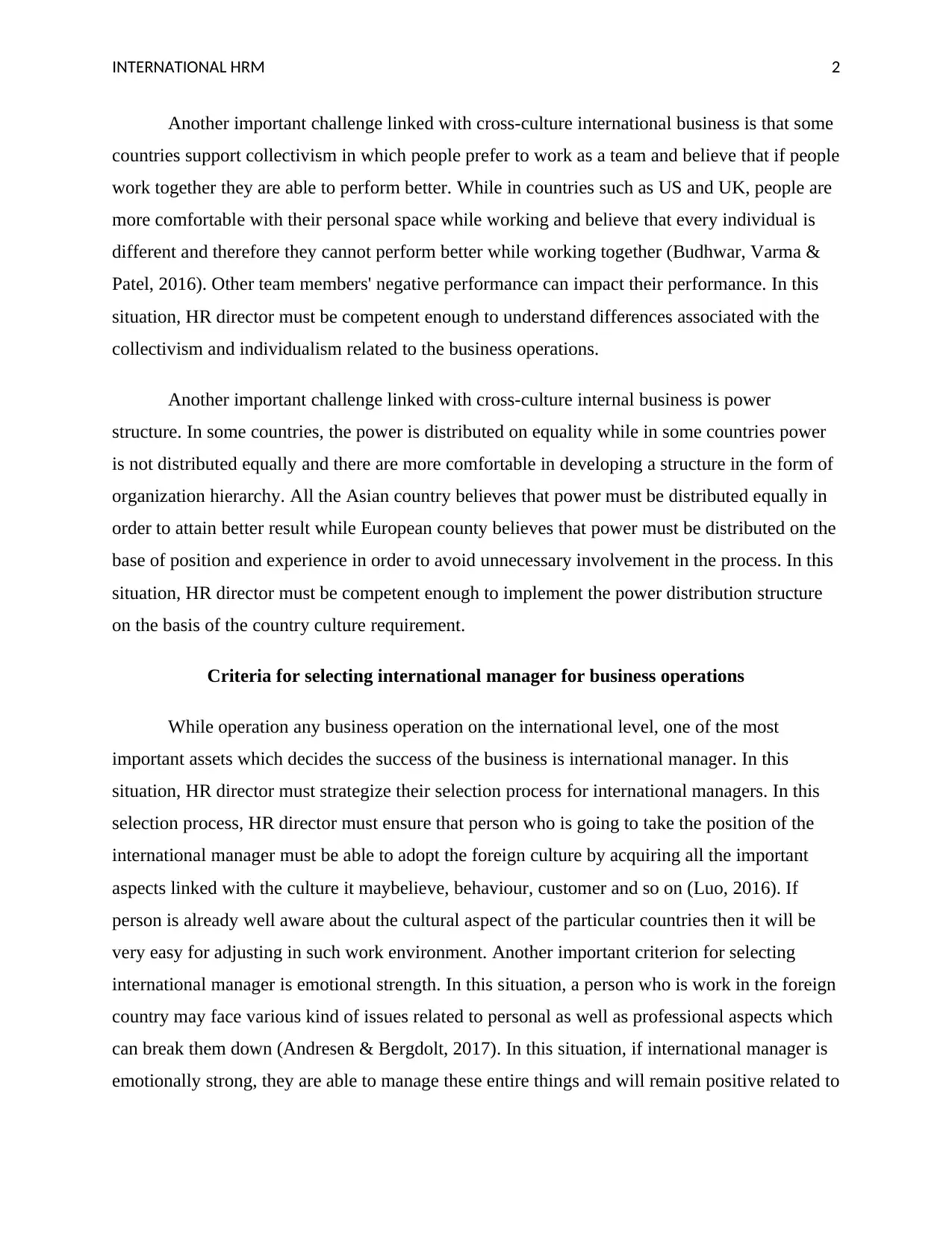
INTERNATIONAL HRM 2
Another important challenge linked with cross-culture international business is that some
countries support collectivism in which people prefer to work as a team and believe that if people
work together they are able to perform better. While in countries such as US and UK, people are
more comfortable with their personal space while working and believe that every individual is
different and therefore they cannot perform better while working together (Budhwar, Varma &
Patel, 2016). Other team members' negative performance can impact their performance. In this
situation, HR director must be competent enough to understand differences associated with the
collectivism and individualism related to the business operations.
Another important challenge linked with cross-culture internal business is power
structure. In some countries, the power is distributed on equality while in some countries power
is not distributed equally and there are more comfortable in developing a structure in the form of
organization hierarchy. All the Asian country believes that power must be distributed equally in
order to attain better result while European county believes that power must be distributed on the
base of position and experience in order to avoid unnecessary involvement in the process. In this
situation, HR director must be competent enough to implement the power distribution structure
on the basis of the country culture requirement.
Criteria for selecting international manager for business operations
While operation any business operation on the international level, one of the most
important assets which decides the success of the business is international manager. In this
situation, HR director must strategize their selection process for international managers. In this
selection process, HR director must ensure that person who is going to take the position of the
international manager must be able to adopt the foreign culture by acquiring all the important
aspects linked with the culture it maybelieve, behaviour, customer and so on (Luo, 2016). If
person is already well aware about the cultural aspect of the particular countries then it will be
very easy for adjusting in such work environment. Another important criterion for selecting
international manager is emotional strength. In this situation, a person who is work in the foreign
country may face various kind of issues related to personal as well as professional aspects which
can break them down (Andresen & Bergdolt, 2017). In this situation, if international manager is
emotionally strong, they are able to manage these entire things and will remain positive related to
Another important challenge linked with cross-culture international business is that some
countries support collectivism in which people prefer to work as a team and believe that if people
work together they are able to perform better. While in countries such as US and UK, people are
more comfortable with their personal space while working and believe that every individual is
different and therefore they cannot perform better while working together (Budhwar, Varma &
Patel, 2016). Other team members' negative performance can impact their performance. In this
situation, HR director must be competent enough to understand differences associated with the
collectivism and individualism related to the business operations.
Another important challenge linked with cross-culture internal business is power
structure. In some countries, the power is distributed on equality while in some countries power
is not distributed equally and there are more comfortable in developing a structure in the form of
organization hierarchy. All the Asian country believes that power must be distributed equally in
order to attain better result while European county believes that power must be distributed on the
base of position and experience in order to avoid unnecessary involvement in the process. In this
situation, HR director must be competent enough to implement the power distribution structure
on the basis of the country culture requirement.
Criteria for selecting international manager for business operations
While operation any business operation on the international level, one of the most
important assets which decides the success of the business is international manager. In this
situation, HR director must strategize their selection process for international managers. In this
selection process, HR director must ensure that person who is going to take the position of the
international manager must be able to adopt the foreign culture by acquiring all the important
aspects linked with the culture it maybelieve, behaviour, customer and so on (Luo, 2016). If
person is already well aware about the cultural aspect of the particular countries then it will be
very easy for adjusting in such work environment. Another important criterion for selecting
international manager is emotional strength. In this situation, a person who is work in the foreign
country may face various kind of issues related to personal as well as professional aspects which
can break them down (Andresen & Bergdolt, 2017). In this situation, if international manager is
emotionally strong, they are able to manage these entire things and will remain positive related to
⊘ This is a preview!⊘
Do you want full access?
Subscribe today to unlock all pages.

Trusted by 1+ million students worldwide
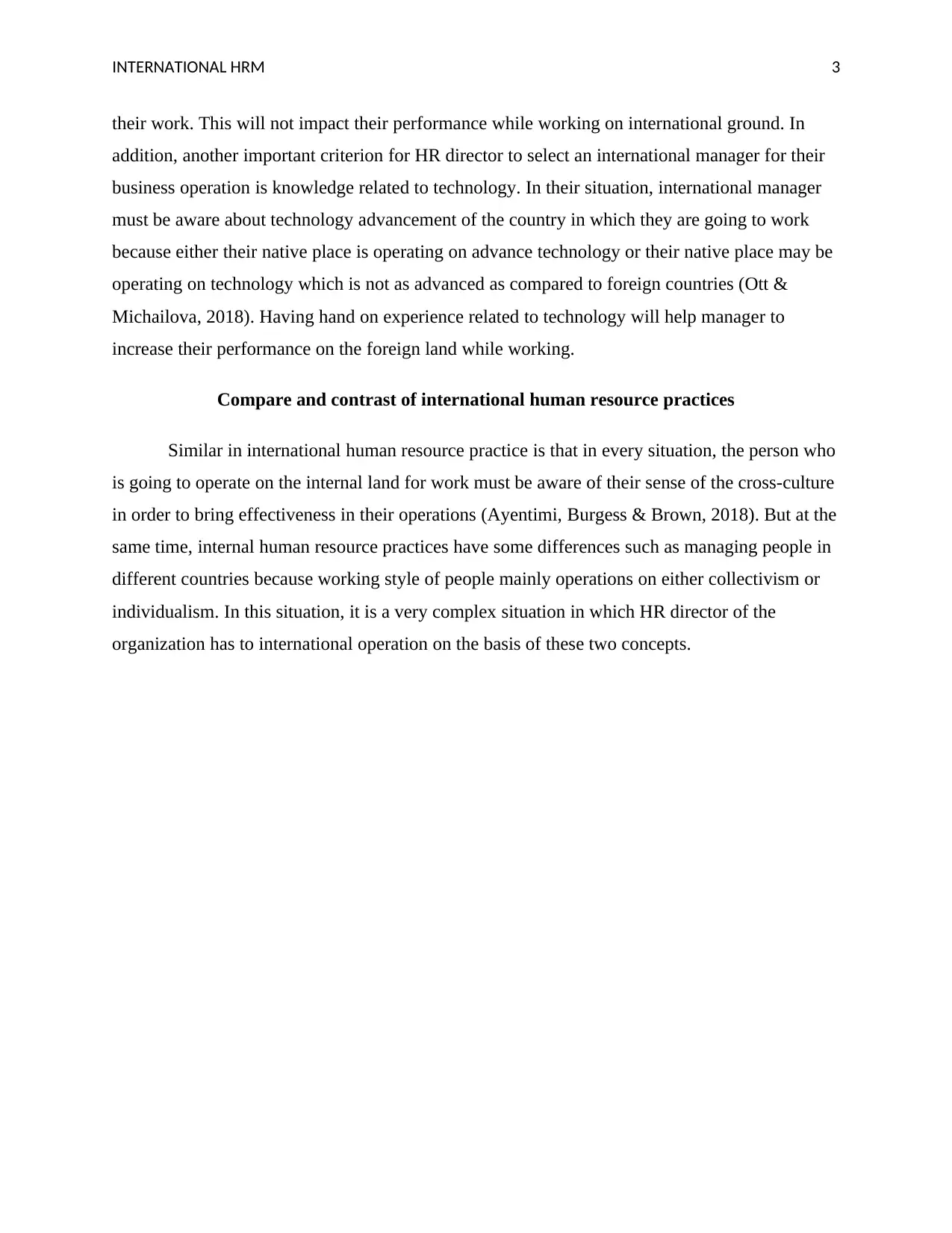
INTERNATIONAL HRM 3
their work. This will not impact their performance while working on international ground. In
addition, another important criterion for HR director to select an international manager for their
business operation is knowledge related to technology. In their situation, international manager
must be aware about technology advancement of the country in which they are going to work
because either their native place is operating on advance technology or their native place may be
operating on technology which is not as advanced as compared to foreign countries (Ott &
Michailova, 2018). Having hand on experience related to technology will help manager to
increase their performance on the foreign land while working.
Compare and contrast of international human resource practices
Similar in international human resource practice is that in every situation, the person who
is going to operate on the internal land for work must be aware of their sense of the cross-culture
in order to bring effectiveness in their operations (Ayentimi, Burgess & Brown, 2018). But at the
same time, internal human resource practices have some differences such as managing people in
different countries because working style of people mainly operations on either collectivism or
individualism. In this situation, it is a very complex situation in which HR director of the
organization has to international operation on the basis of these two concepts.
their work. This will not impact their performance while working on international ground. In
addition, another important criterion for HR director to select an international manager for their
business operation is knowledge related to technology. In their situation, international manager
must be aware about technology advancement of the country in which they are going to work
because either their native place is operating on advance technology or their native place may be
operating on technology which is not as advanced as compared to foreign countries (Ott &
Michailova, 2018). Having hand on experience related to technology will help manager to
increase their performance on the foreign land while working.
Compare and contrast of international human resource practices
Similar in international human resource practice is that in every situation, the person who
is going to operate on the internal land for work must be aware of their sense of the cross-culture
in order to bring effectiveness in their operations (Ayentimi, Burgess & Brown, 2018). But at the
same time, internal human resource practices have some differences such as managing people in
different countries because working style of people mainly operations on either collectivism or
individualism. In this situation, it is a very complex situation in which HR director of the
organization has to international operation on the basis of these two concepts.
Paraphrase This Document
Need a fresh take? Get an instant paraphrase of this document with our AI Paraphraser
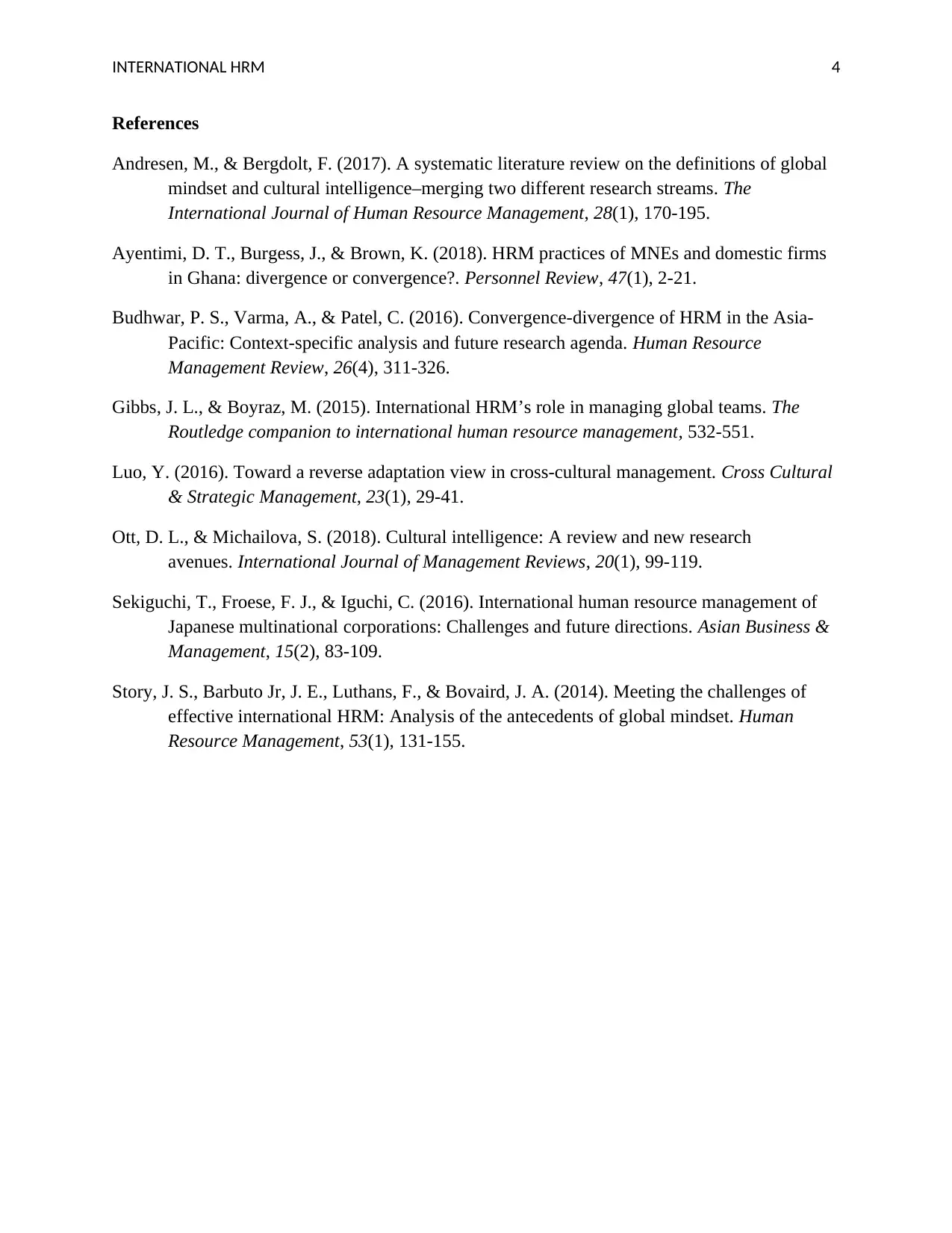
INTERNATIONAL HRM 4
References
Andresen, M., & Bergdolt, F. (2017). A systematic literature review on the definitions of global
mindset and cultural intelligence–merging two different research streams. The
International Journal of Human Resource Management, 28(1), 170-195.
Ayentimi, D. T., Burgess, J., & Brown, K. (2018). HRM practices of MNEs and domestic firms
in Ghana: divergence or convergence?. Personnel Review, 47(1), 2-21.
Budhwar, P. S., Varma, A., & Patel, C. (2016). Convergence-divergence of HRM in the Asia-
Pacific: Context-specific analysis and future research agenda. Human Resource
Management Review, 26(4), 311-326.
Gibbs, J. L., & Boyraz, M. (2015). International HRM’s role in managing global teams. The
Routledge companion to international human resource management, 532-551.
Luo, Y. (2016). Toward a reverse adaptation view in cross-cultural management. Cross Cultural
& Strategic Management, 23(1), 29-41.
Ott, D. L., & Michailova, S. (2018). Cultural intelligence: A review and new research
avenues. International Journal of Management Reviews, 20(1), 99-119.
Sekiguchi, T., Froese, F. J., & Iguchi, C. (2016). International human resource management of
Japanese multinational corporations: Challenges and future directions. Asian Business &
Management, 15(2), 83-109.
Story, J. S., Barbuto Jr, J. E., Luthans, F., & Bovaird, J. A. (2014). Meeting the challenges of
effective international HRM: Analysis of the antecedents of global mindset. Human
Resource Management, 53(1), 131-155.
References
Andresen, M., & Bergdolt, F. (2017). A systematic literature review on the definitions of global
mindset and cultural intelligence–merging two different research streams. The
International Journal of Human Resource Management, 28(1), 170-195.
Ayentimi, D. T., Burgess, J., & Brown, K. (2018). HRM practices of MNEs and domestic firms
in Ghana: divergence or convergence?. Personnel Review, 47(1), 2-21.
Budhwar, P. S., Varma, A., & Patel, C. (2016). Convergence-divergence of HRM in the Asia-
Pacific: Context-specific analysis and future research agenda. Human Resource
Management Review, 26(4), 311-326.
Gibbs, J. L., & Boyraz, M. (2015). International HRM’s role in managing global teams. The
Routledge companion to international human resource management, 532-551.
Luo, Y. (2016). Toward a reverse adaptation view in cross-cultural management. Cross Cultural
& Strategic Management, 23(1), 29-41.
Ott, D. L., & Michailova, S. (2018). Cultural intelligence: A review and new research
avenues. International Journal of Management Reviews, 20(1), 99-119.
Sekiguchi, T., Froese, F. J., & Iguchi, C. (2016). International human resource management of
Japanese multinational corporations: Challenges and future directions. Asian Business &
Management, 15(2), 83-109.
Story, J. S., Barbuto Jr, J. E., Luthans, F., & Bovaird, J. A. (2014). Meeting the challenges of
effective international HRM: Analysis of the antecedents of global mindset. Human
Resource Management, 53(1), 131-155.
1 out of 5
Related Documents
Your All-in-One AI-Powered Toolkit for Academic Success.
+13062052269
info@desklib.com
Available 24*7 on WhatsApp / Email
![[object Object]](/_next/static/media/star-bottom.7253800d.svg)
Unlock your academic potential
Copyright © 2020–2026 A2Z Services. All Rights Reserved. Developed and managed by ZUCOL.





